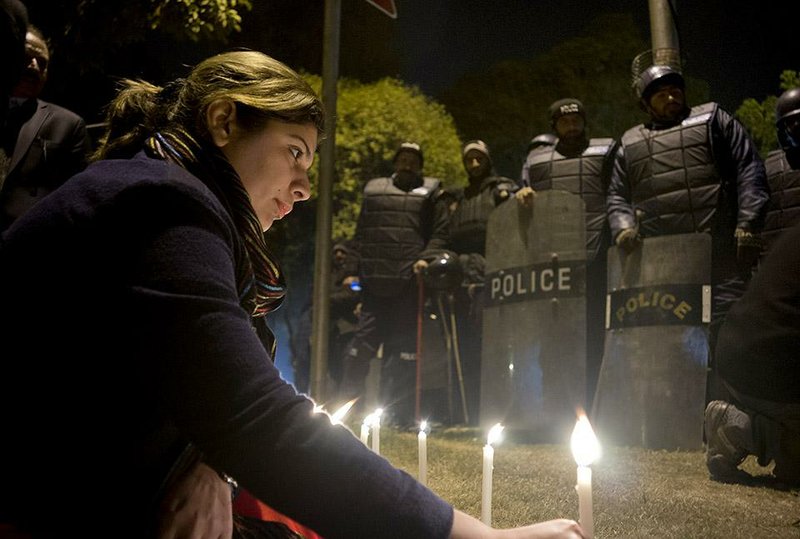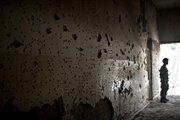ISLAMABAD, Pakistan -- A Pakistani court on Thursday granted bail to a key suspect in a deadly 2008 assault in Mumbai, sparking outrage in India and further muddying perceptions about Pakistan's resolve to combat terrorism.
The judicial decision -- made over objections from government lawyers -- comes as Pakistani leaders vow major crackdowns on militants after Taliban gunmen killed 148 students and teachers in an attack in the northwestern city of Peshawar on Tuesday.
"Does Pakistan not think of the Mumbai terror attack as a big thing?" said Ujjwal Nikam, the public prosecutor in the November 2008 assault, which began with commando-style strikes and culminated with a siege at the city's landmark Taj hotel, killing 166 people.
At a hastily arranged news conference in Mumbai, Nikam accused Pakistan of "following two standards."
"One policy to deal with Taliban's terror, another when groups are targeting India," he said.
Hours earlier, a judge in an anti-terrorism court in Rawalpindi granted Zaki-ur-Rahman Lakhvi, a suspected leader of the Pakistan-based Lashkar-e-Taiba militant group, a $10,000 bail.
Lakhvi's attorney, Rizwan Abbasi, said there was no "substantial evidence" against his client other than claims that he was a commander of the Lashkar-e-Taiba group.
"This charge can't prove he was involved in the Mumbai attack. And it also couldn't be proved that he was commander" of the group, he said.
Calling the situation "unfortunate," India's minister of home affairs, Rajnath Singh, demanded that Pakistani leaders appeal Lakhvi's release.
In the 2008 attacks, 10 gunmen from Lashkar-e-Taiba entered Mumbai from the sea via Karachi and waged a campaign of terror over two days. Armed with explosives and automatic rifles, they launched a coordinated attack on the Taj Mahal Palace & Tower hotel as well as a synagogue and educational center. About 300 people were wounded.
One of the Pakistani terrorists linked to the attacks, Ajmal Amir Kasab, was arrested by the police during the attack and hanged in 2012. But Pakistan, which has fought three major wars with India, refused to hand over the additional suspects.
Lakhvi and six other men were brought up on charges in Pakistan.
"We call upon the government of Pakistan to immediately take steps to reverse this decision. There can be no selective approaches to terrorism," said Syed Akbaruddin, spokesman for India's Ministry of External Affairs.
There was no immediate official comment from Pakistan. A Pakistani diplomatic official, who was not authorized to discuss the matter publicly and spoke on the condition of anonymity, noted that the country "has independent courts" but stressed that the government will file an appeal.
With Pakistan still grieving over the massacre at the army-run school, Prime Minister Nawaz Sharif has said in recent days that the country will crush terrorism in all its "forms and manifestations."
And, despite decades of hostility between the two countries, India's prime minister called Sharif on Wednesday to offer his condolences for the attack. Schoolchildren across India also observed a two-minute silence Wednesday for the victims.
Pakistani intelligence officials suspect the attack was planned from Afghanistan, where many top Pakistani Taliban leaders are thought to reside.
Pakistan's powerful army chief, Gen. Raheel Sharif, traveled to Kabul on Wednesday to seek Afghanistan's help in capturing those leaders.
In northwestern Pakistan, a hub of Taliban activity, police issued an alert to all the prisons warning that militants could attack in attempt to free jailed fighters.
Late Thursday, Pakistan's military said its jets and ground forces had killed 27 militants in a northwestern tribal region near the Afghan border.
In separate statements, the military said the airstrikes and ground operation were carried out in the Khyber tribal region. It said that ground forces killed 10 while jets killed another 17 militants.
Prime Minister Sharif, no relation to the army chief, also announced Wednesday that Pakistan was lifting a moratorium on the death penalty. Sharif met with Pakistani President Mamnoon Hussain, who oversees death-row appeals, on Thursday to begin preparing a strategy for expediting justice in terrorism cases.
Information for this article was contributed by Shaiq Hussain and Haq Nawaz Khan of The Washington Post.
A Section on 12/19/2014

